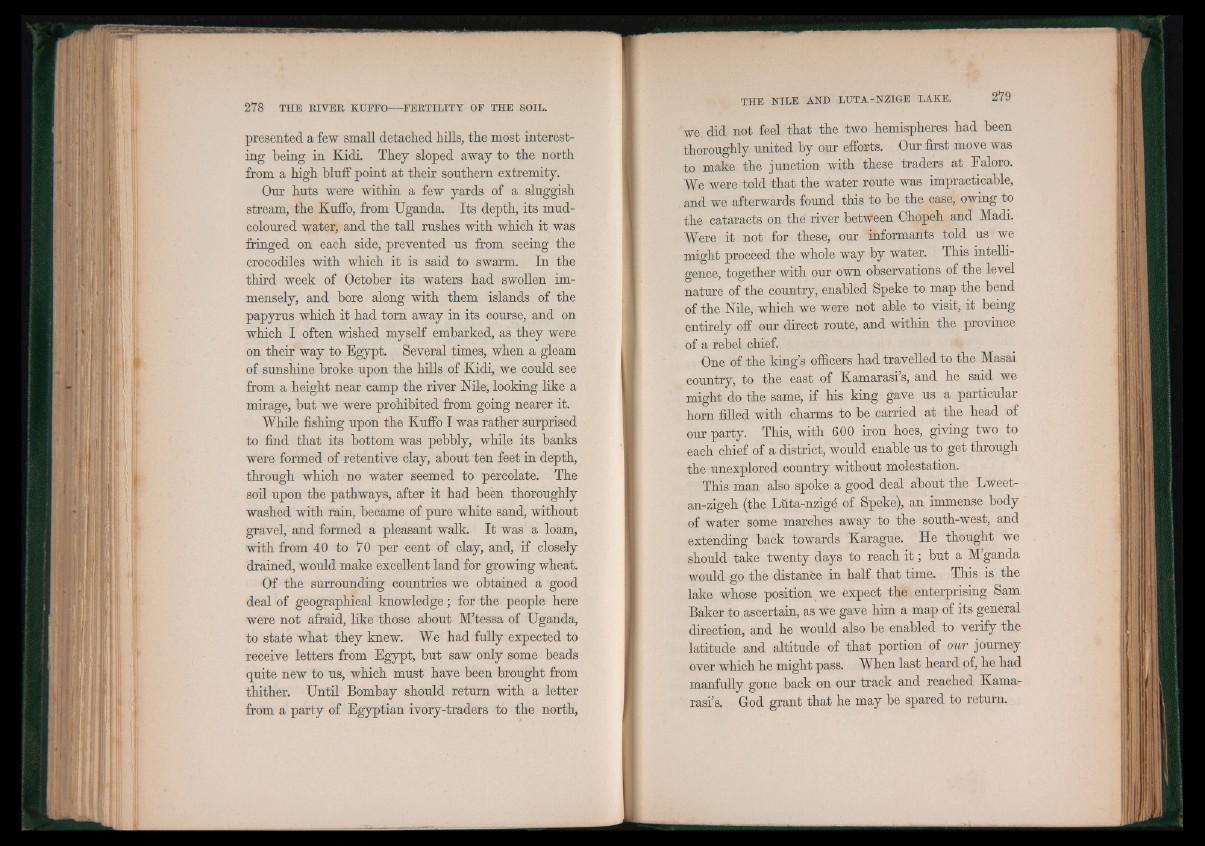
presented a few small detached hills, the most interesting
being in Kidi. They sloped away to the north
from a high bluff point at their southern extremity.
Our huts were within a few yards of a sluggish
stream, the Kuffo, from Uganda. Its depth, its mud-
coloured water, and the tall rushes with which it was
fringed on each side, prevented us from seeing the
crocodiles with which it is said to swarm. In the
third week of October its waters had swollen immensely,
and bore along with them islands of the
papyrus which it had torn away in its course, and on
which I often wished myself embarked, as they were
on their way to Egypt. Several times, when a gleam
of sunshine broke upon the hills of Kidi, we could see
from a height near camp the river Nile, looking like a
mirage, hut we were prohibited from going nearer it.
While fishing upon the Kuffo I was rather surprised
to find that its bottom was pebbly, while its banks
were formed of retentive clay, about ten feet in depth,
through which no water seemed to percolate. The
soil upon the pathways, after it had been thoroughly
washed with rain, became of pure white sand, without
gravel, and formed a pleasant walk. It was a loam,
with from 40 to 70 per cent of clay, and, if closely
drained, would make excellent land for growing wheat.
Of the surrounding countries we obtained a good
deal of geographical knowledge; for the people here
were not afraid, like those about M’tessa of Uganda,
to state what they knew. We had fully expected to
receive letters from Egypt, but saw only some beads
quite new to us, which must have been brought from
thither. Until Bombay should return with a letter
from a party of Egyptian ivory-traders to the north,
we did not feel that the two hemispheres had been
thoroughly united by our efforts. Our first move was
to make the junction with these traders at Faloro.
We were told that the water route was impracticable,
and we afterwards found this to be the case, owing to
the cataracts on the river between Chopeh and Madi.
Were it not for these, our informants told us we
might proceed the whole way by water. This intelligence,
together with our own observations of the level
nature of the country, enabled Speke to map the bend
of the Nile, which we were not able to visit, it being
entirely off our direct route, and within the province
of a rebel chief.
One of the king’s officers had travelled to the Masai
country, to the east of Kamarasi’s, and he said we
might do the same, if his king gave us a particular
horn filled with charms to be carried at the head of
our party. This, with 600 iron hoes, giving two to
each chief of a district, would enable us to get through
the unexplored country without molestation.
This man also spoke a good deal about the Lweet-
an-zigeh (the Lüta-nzigé of Speke), an immense body
of water some marches away to the south-west, and
extending back towards Karague. He thought we
should take twenty days to reach i t ; but a M’ganda
would go the distance in half that time. This is the
lake whose position we expect the enterprising Sam
Baker to ascertain, as we gave him a map of its general
direction, and he would also be enabled to verify the
latitude and altitude of that portion of our journey
over which he might pass. When last heard of, he had
manfully gone back on our track and reached Kamarasi’s.
God grant that he may be spared to return.